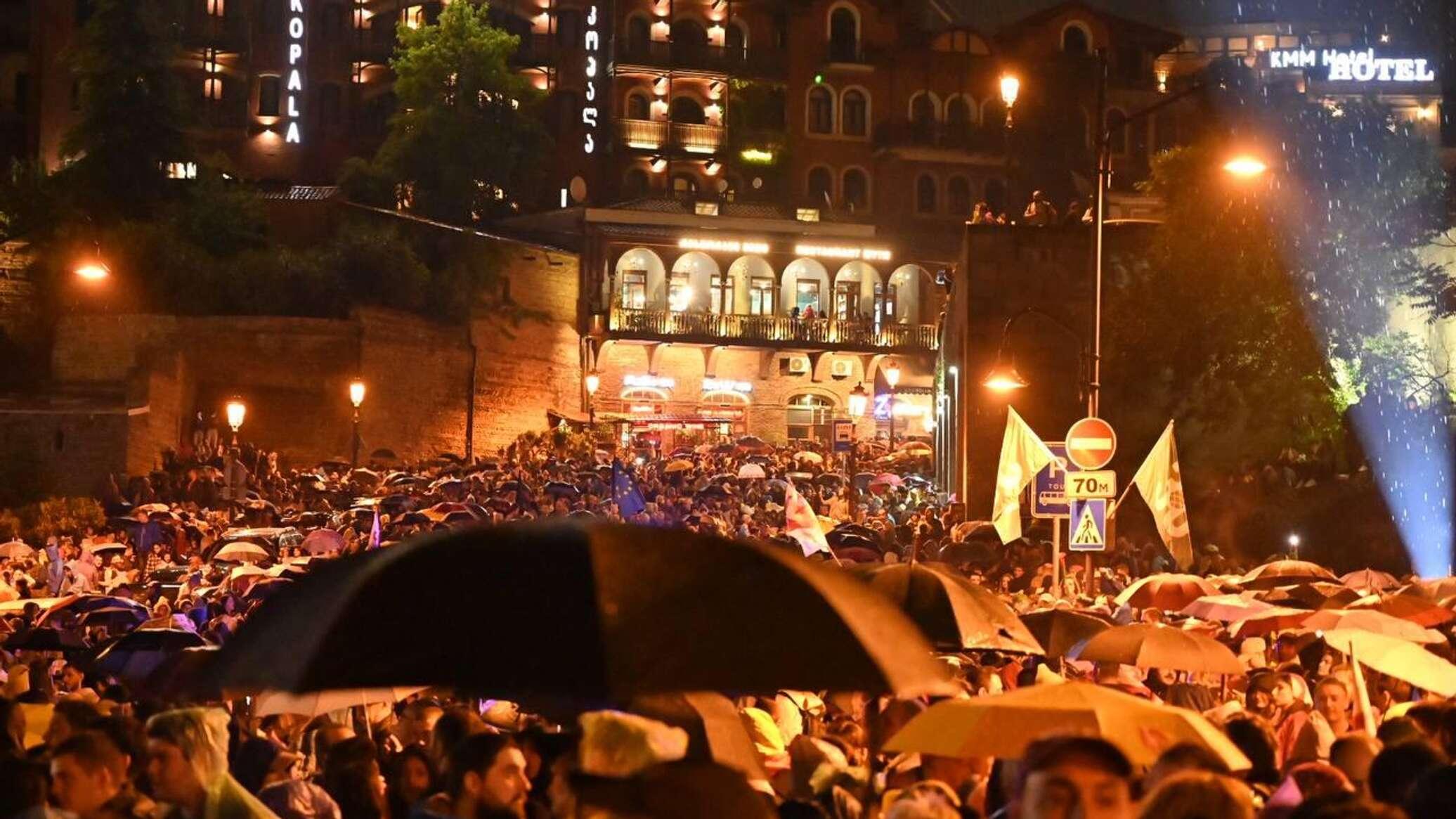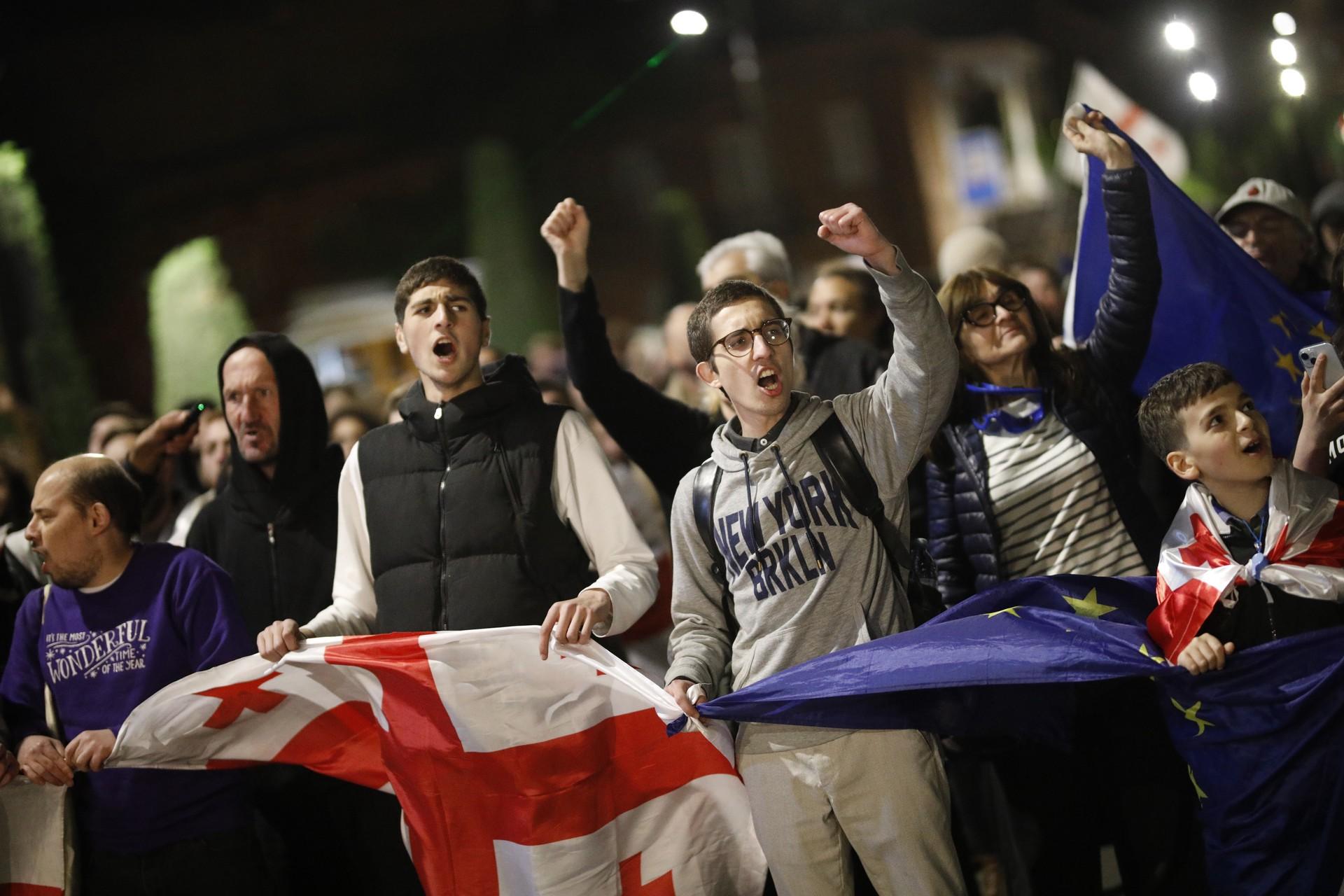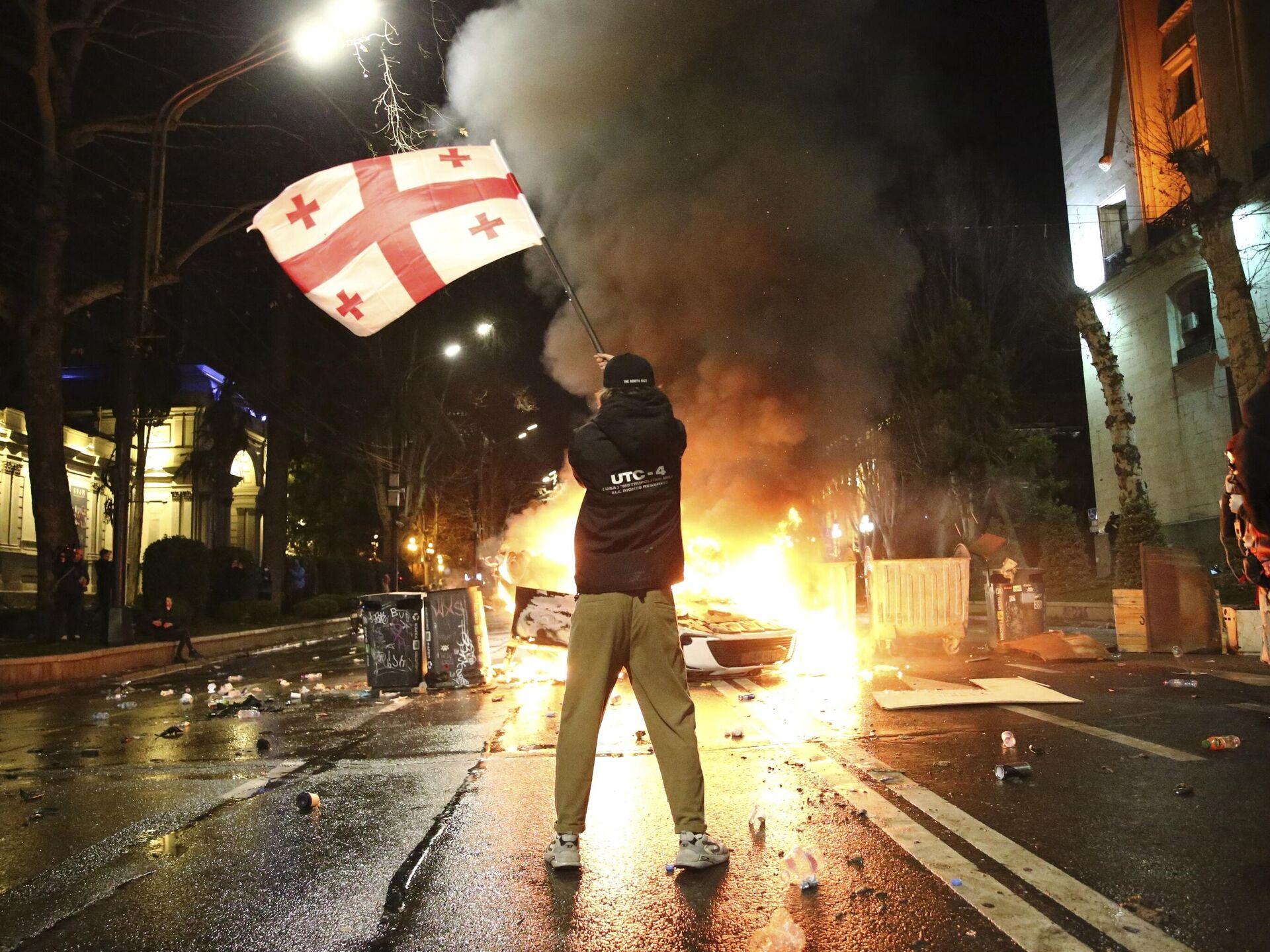Protests escalate over foreign agents law Geopolitical struggle in Georgia
Georgia seems to be planning another color revolution. The adoption of the law on foreign agents, as well as attempts to disperse rallies in front of the parliament have stimulated it. The total number of protesters in Tbilisi alone is about 200,000 - for a country with a population of about 3.7 million, this is about 5.4 percent, which corresponds to similar events in the Arab Spring. The common demand of the opposition is the abolition of the unpopular law on foreign agents and the change of Georgia's pro-Russian course to a pro-Western one.
There is a view, propagated by the opposition, according to which the country's ruling billionaire Bidzina Ivanishvili and his Georgian Dream party believed that they could not win the next elections. Therefore, they allegedly decided to liquidate hundreds of pro-Western NGOs operating in the country so that nothing would prevent them from winning the elections. The law on foreign agents may help them in this, since numerous NGOs receive funding from the West. According to another version, Ivanishvili, who has so far maneuvered between Russia and the collective West, has received a signal from the Europeans and Americans that they want him out, and has decided to finally tighten the screws in Georgia and lean toward Russia.
For their part, the ruling party and its supporters say they are preventing the country from joining an anti-Russian alliance that could end in a dangerous confrontation with Moscow for Georgia. In addition, even some neutral observers question the inevitability of the Georgian Dream's defeat in the elections to be held in the fall: the country's economy continues to grow. In 2023, Georgia's GDP increased by 7 per cent after growing by 10.4 per cent in 2022. In January-March 2024, GDP grew by 7.8 per cent, as reported by the National Statistics Service of Georgia. Of course, there is a lot of social inequality in the country and many people continue to live in poverty despite economic growth. Still, such high growth is a factor that works for the incumbent government.
Ivanishvili's problem is that his party and line is supported by only about a third of the population, more often the elderly, and support is steadily eroding as his electorate dwindles due to natural causes.
Young people in Georgia are mostly pro-European. But it is not only about them. According to sociological surveys, about 70-80 per cent of the country's citizens support the course of joining the EU and NATO. Therefore, the actions of the ruling party, which caused the conflict with the European Union, irritate a part of the population and lead to the mobilization of national feelings, which are now largely directed against the government. Besides, there are two factors that divide Russia and Georgian nationalism - Abkhazia and Ossetia. Therefore, the protesters are helped to some or even a very large extent by nationalist and at the same time pro-European sentiments.

On the other hand, the ruling Georgian Dream may ask a reasonable question: negotiations on Georgia's accession to the EU and NATO have been going on for a long time, and no one is obviously going to take Georgia there. Then why play this game? The West does not say "No", but it does not say "Yes" either. Georgia has found itself in some strange political friend zone, when it is promised a lot of things and given almost nothing, and this situation has been going on for years. At best, some Georgians have been able to go to Europe to study. But if the West does not give military protection and real support, then why make Russia angry? It is pointless and dangerous.
The forces of the sides
The current protests are a typical spontaneous movement organized through a network. Georgia's opposition parties are participating in it, but do not yet control it. There are many of these parties, each with only a few per cent support, except for one, the former ruling party United National Movement (UNM). Support for the UNM is about 15 per cent, but the critical attitude toward it and its leader (currently in prison), Mikheil Saakashvili, is shared by as many, if not more, voters.
However, in this case, the fragmentation of the political opposition is not a factor that destroys the protests, because we have a typical modern leaderless network movement. It has a multi-class character, but its core is the capital's youth, students, famous bloggers who support them, and small and medium-sized entrepreneurs who support the protesters. It is probably possible to distinguish the core - student youth, people from the middle strata of the population and part of business, primarily IT, who are interested in the development of representative democracy systems and cooperation with the EU. The movement strongly resembles some protests in Belarus, Sudan, Iran. Although unlike modern Iran, Georgian protests do not involve the working class and national minorities. Let us recall that in Iran the main centers of protests were Kurdish- and Azerbaijani-populated areas, as well as Sistan and Baluchistan.
In turn, many of Ivanishvili's supporters are budgetary employees who depend on the government's course and are afraid of losing their jobs. Among them there are employees of state enterprises and officials. However, not all Georgians go to the polls, so it is possible that the available resources could be enough for the Georgian Dream to win the elections.
Are the chances of a new color revolution to win great? The Zoomer Factor
The network has spawned the first globalized generation - the Zoomers. They watch the same Hollywood series, follow different fashion trends and exchange opinions in chat rooms. In principle, the Zoomers more or less share what in the United States are called liberal values.
It would seem that this should prepare the victory of the corresponding systems all over the world, from Iran to Georgia, from Sudan to Belarus. It would be true to some extent to say that it is not Iranians and Georgians who are protesting, but the Zoomers. However, it may turn out to be exactly the opposite, precisely because this generation is adapted to the relevant values. These include not only the parliamentary representative system, market economy and globalization of trade, but also career and self-development objectives. In addition, modern liberal values support a drastic reduction in aggression and pacifism, not at all in the spirit of Gandhi (Mahatma Gandhi believed that non-violent resistance, through which the purification of consciousness is accomplished, is more important than preserving life in the physical body).
The prioritization of individual material interests over collective and spiritual interests, the rejection of "big ideas," and the withdrawal into personal life are also included in the package of modern liberal values. Even when and if their bearers come out to protest, they are unable to formulate any political or social objectives. The reason is extreme self-centeredness, the idea of achieving solely personal success. Public affairs are of little interest, and people go out to protest only when and if something has angered or affected you personally.
Zoomers are disgusted by conservatives, especially because they limit personal expression. They also abhor or misunderstand socialists insofar as they speak of social revolution, collectivism, and the possibility of transforming the world on the basis of a system of councils and public property. Any conservatives or socialists who try to conform to the values of the Zoomers become liberals. In essence, this is a movement of young people from large metropolitan areas, children of more or less well-off or at least not starving parents, university students who dream of getting a good profession and then integrating into the global market. There is also a term for them - "middle-class youth". Such people can create a street crowd, but with few exceptions are not capable of any serious actions dangerous to their opponents.
Moreover, they are clearly unable to articulate any particular programs for concrete change outside the general field of liberal ideas. One gets the feeling that liberal society, or at least liberal youth, is inevitably victimized. Perhaps it is no accident that modern liberal ideology creates a cult of victimhood. It is not the cult of sacrifice in the name of correcting social life, achieving a golden age on earth or saving a soul in heaven, no, it is precisely the cult of the victim of violence. Nor is it a coincidence that this philosophy of life involves a ban on personal weapons. Their heroines are not like the biblical Judith, they are girls who built their careers with the help of Harvey Weinstein and then publicly resented him.
Liberal views and pacifism seem to prevail among the participants in Georgia's predominantly youth and metropolitan protests. This circumstance leads to the same results everywhere - defeat and death.

A large grassroots revolutionary movement can win, but it is worth remembering what happened in Iran in 1979, during the demonstrations against the Shah's monarchy. Workers, outraged by poverty and meager wages, shut down and took over factories in the fall of 1978. They paralyzed the economy in a nationwide strike, then the factories were taken over by labor collectives. Counter-power structures - factory and territorial elected councils, which depended on labor or district assemblies began to be created. They took control of the situation at the factories and in urban areas.
In addition, the crowds of believers fell into a trance at the sight of the death of their loved ones and comrades, they began to perceive what was happening as a way to save their souls or as a mysterious event, as a way of purification, the shootings did not so much frighten them as lift them up for further struggle. It wasn't until a year after the protests began that soldiers of the Shah's regime began to drop their weapons and side with the protesters because they could no longer bear what was happening. Then on February 10-11, an attempt by the Shah's Guard to launch a counteroffensive sparked an armed uprising - between 300,000 and 500,000 residents of Tehran, taking weapons from military depots, joined the battle and defeated the enemy. A total of about 10,000 participants were killed in the events. However, the fruits of the victory were then used by the Iranian clergy, crushing both supporters of socialism (workers' councils in factories) and supporters of the parliamentary system. Had the clergy's opponents been more determined, things might have turned out differently.
But these events, no matter how one treats them, have nothing to do with Georgia at present. The Iranian revolution of 1978-1979 was a much broader and much deeper movement, involving different social classes and representatives of quite different ideological doctrines.
It is interesting that participants in modern liberal protests, whether in Sudan or Tbilisi, do not learn from each other. They are not interested in the experience of social movements in other countries - "it's too tedious. During the whole time of the youth protests in Iran in 2022-2023, the participants have not been able to develop any political alternative. Furthermore, they act in a certain way because they cannot otherwise, they seem to be unlearned. This is due to their social position and worldview.

All sorts of things happen. Georgian authorities have their weaknesses - for example, a small number of law enforcers. The power may waver. But so far, all or almost all protests of the Zoomers, the middle-class youth movement in almost all countries of the world, have been eliminated.
In Georgia, opponents of the protests have turned to point attacks. In particular, a Moldovan citizen Adamia was detained at a rally against the law on foreign agents being reviewed by the Georgian parliament in Tbilisi, as reported by the Georgian Imedi TV channel. It is noted that law enforcers consider Adamia as one of the organizers of the protest actions. According to preliminary information, the Moldovan was detained for insulting and attacking a police officer with pepper spray. Several people were taken away with Adamia, and it is claimed that the detentions were brutal. Law enforcers and opponents of the protests attacked and beat up participants of the movement - from youth activists to members of opposition parties.
Since liberal demonstrators, due to their beliefs, life experiences and ideology, are not willing to risk their lives and do not understand what to do in such a situation, the tactic can be successful in knocking the breath out of protests and shocking the participants. When more and more liberal-minded people realize that their bones are about to be broken and they are unable to do anything about it, they become depressed and stop participating in protests. Usually the decline happens after six months. So far we have seen a typical scenario of defeat of liberal youth protests all over the world, from Khartoum (the capital of Sudan) to Tehran.
Will Georgia bring any changes to this scenario? This issue will be settled in the coming weeks or months.
The views and opinions expressed by guest columnists in their op-eds may differ from and do not necessarily reflect the views of the editorial staff.








